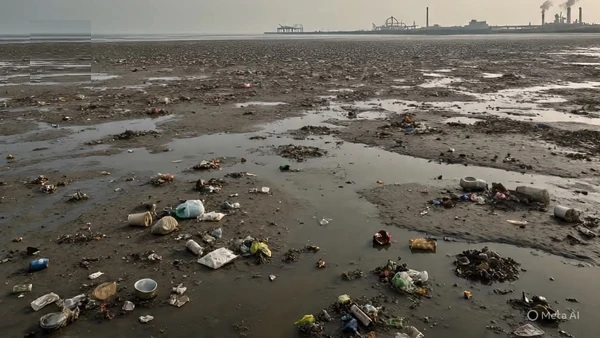The Yemeni Ministry of Agriculture, Fisheries, and Water Resources today condemned what it described as systematic environmental crimes committed by the “occupation” forces off the Yemeni coast. The ministry warned of the severe consequences of these actions on the marine environment, food security, and the health of millions of Yemenis.
In a statement, the ministry asserted that the Red Sea and Gulf of Aden have been turned into open dumps for toxic waste due to the practices of the occupying forces. It specified that over 500 tons of plastic and medical waste are dumped daily, in addition to the leakage of more than 15 million liters of oil derivatives from abandoned ships and dilapidated tankers. This has led to the formation of suffocating oil slicks on the sea’s surface, which are devastating marine life.
The statement clarified that 17 traditional fishing areas have been converted into military waste dumps. It also accused illegal fishing vessels of using internationally prohibited nets that have destroyed coral reefs, wiped out fish habitats, and led to the extinction of over 30 rare marine species.
Laboratory tests on fish samples from Aden revealed lead levels nine times higher than the globally permissible limit. The ministry warned that this poses a threat of widespread chronic diseases, most notably kidney failure and nerve damage, noting a significant increase in cases of food poisoning, especially among children.
The ministry’s statement also pointed out that these violations are part of a deliberate policy to target Yemeni fishermen and their livelihoods by restricting their activities. It also accused the forces of destroying coral reefs and killing turtles, dolphins, and young fish. The ministry considered the silence of the “mercenary government” on these crimes to be a “stain of shame” and blatant complicity with the “Emirati occupation.”
The Ministry of Agriculture and Fisheries called on the Yemeni people and their active forces to confront these crimes and expose them locally and internationally. It warned against complacency in protecting marine wealth, considering it a fundamental pillar of national food security and a right for future generations.
The ministry also called on international and environmental organizations to fulfill their responsibilities by condemning these crimes and pressuring the aggressor forces to stop them immediately. It affirmed its commitment to continue monitoring, documenting, and pursuing those involved in these violations before national and international courts.




















